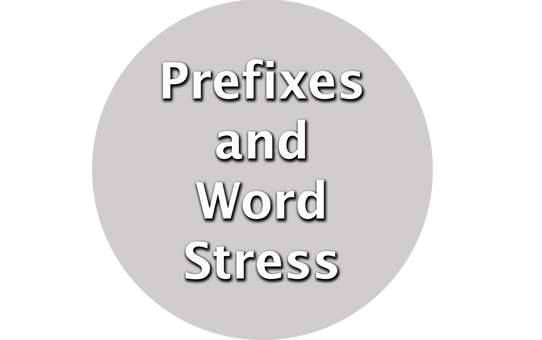Some words are made up of a prefix and a root:
dislike
| prefix | → | dis | like | ← | root |
Common prefixes include: de-, dis-, il-, re-, un-.
Sometimes the root can be used as an independent word (e.g. like), but other roots cannot (e.g. renounce and denounce, but not ‘nounce‘).
In some words the prefix is unstressed and is only made prominent for particular contrast. Compare:
A: Do you enjoy driving?
B: No, I really disLIKE it.
A: I thought you LIKED driving.
B: No, I really DISlike it.
(In phonetic transcriptions, words like this are usually shown as having only one (main) stressed syllable:
dislike /d ɪ ‘s l aɪ k /)
Other words like dislike include:
| de’grade | de’flect | de’fraud |
| di’scolour | di’scourage | di’sintegrate |
| il’legal | il’legible | il’literate |
| re’claim | re’fresh | re’place |
| un’easy | un’pack | un’wise |
Other words with these prefixes have secondary stress on the prefix:
ˌdecom’pose ˌrecon’sider ˌunaf’fected
Exercise 1
Complete the sentences with words from the table above. Underline the syllable that you think will have the main stress in these words.
EXAMPLE
They’re going to ___replace___ most of the workers with machines.
1 It’s _______ to forecast the weather too far ahead.
2 I haven’t had time to _______ since I got back from holiday.
3 We have to _______ her from working too hard.
4 Parking on a double yellow line is _______ .
Now listen and check your answers. Then say the sentences aloud.
Exercise 2
Write the same words from exercise above (including the example) in the spaces in these conversations. Again, underline the syllables that you think will have the main stress in these words.
EXAMPLE
A: Would it be a wise investment?
B: No, I think it would be very ____unwise___.
1 A: Did you say you’ve misplaced your keys?
B: No, I said I have to _______ them.
2 A: I suppose it’s legal to bring alcohol into the country?
B: No, it’s completely _______ .
3 A: Did it take long to pack your case?
B: Ages, but it won’t take long to _______ it.
4 A: Did your teacher encourage you to do the maths course?
B: No, she tried to _______ me from doing it.
Now listen, check your answers and say the B parts aloud.
In words with de– and re– prefixes, the prefix is usually pronounced /d ɪ / and /r ɪ / if it is unstressed and /d i: / and /r i:/ if it has secondary stress. Compare:
de’grade /d ɪ / but:ˌ decom’pose /d i: /
re’claim / r ɪ / but:ˌ recon’sider /r i: /
A few words with de– and re– prefixes are usually pronounced with an unstressed / ɪ / in the prefix when they are used as a verb and a stressed / i: / in the prefix when they are used as a noun. Compare:
Interest is likely to decrease, / d ɪ ‘k r i: s /
but: There has been a decrease / ‘d i: k r i: s / in interest.
Some words beginning re– have the same spelling but a different stress and meaning depending on whether re– means ‘again’ or not. Compare:
recover /ˌr i: ˈk ʌ v ə / (= cover again) – /r ɪ ˈk ʌ v ə/ (= get well)
recount /ˌr i: ˈk aʊ n t/(= count again) – /r ɪ ˈk aʊ n t/ (= describe)
reform /ˌr i: ˈf ɔː m / (= form again) – /r ɪ ˈf ɔː m/ (= improve)
remark /ˌr i: ˈm ɑː k / (= mark again) – /r ɪ ˈm ɑː k/ (=comment)
resort /ˌr i: ˈz ɔː t/(= sort again) – /r ɪ ˈz ɔː t/ (= turn to)
resign /ˌr i: ˈs aɪ n/ (= sign again) – /r ɪ ˈz aɪ n/ (= give up a job)
Note: When re– means ‘again’, the words are sometimes spelt with a hyphen, e.g. re-cover, re-count.
Exercise 3
Choose words from above to complete the pairs of sentences. Use the same word in each pair. Think about the pronunciation of the words you have written and say the sentences aloud.
EXAMPLE
a The band hasn’t played together for years, but they’ve said they’ll ___reform___ for the charity concert. (/ˌr i: ˈf ɔː m / = form again)
b The government are going to ___reform___ health care. (/ r ɪ ˈf ɔː m / = improve)
1 a She’d been seriously ill and it took her a long time to _____ .
b The chair was badly stained, so we had to _____ it.
2 a He hasn’t agreed yet to _____ for the club for the next baseball season.
b If working conditions don’t improve soon, she’s threatening to _____
3 a When the phone rang, I forgot how many books I’d already put in the box, so I had _____ to them.
b He liked to _____ his wartime experiences to anyone who’d listen.
Now listen and check.
Put the following verbs in the correct column according to the usual pronunciation of the de or re prefix. Some are done for you.
debug deflate deform delineate demote deregulate descend destabilise devalue reapply reflect recharge reconsider refresh relapse replace resit restructure review
| / d i:- / | / d ɪ- / | / r i:- / | / r ɪ- / |
|---|---|---|---|
| debug | deflate | reapply | reflect |
Now listen and check your answers. Then say the words aloud.
